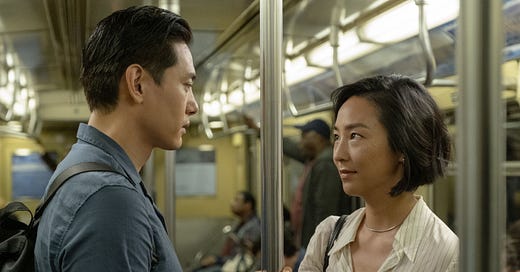Past Lives
A quiet, contemplative but emotionally torrid look at a romance that never was. Filmmaker Celine Song dazzles with her mature vision of true longing and the choices we make.
“This is where I ended up. This is where I’m supposed to be.”
I think the people with the most unhappy love lives are those unable to let go of their youthful concept of romance. When you’re a kid you think love, like most things good in life, is something that just happens. You can pinpoint the arrival of adulthood when they realize that everything of value requires work — especially, the ability to adapt and accept change.
This is never more true than when it comes to who we choose as our partner and mate in life.
“Past Lives” is a film about accepting this very idea. Writer/director Celine Song, with her first feature, shows an exquisite sense of maturity and a dazzling aesthetic as a filmmaker. It’s a quiet, contemplative movie that nonetheless depicts wave after wave of torrid emotions.
In some ways, it’s an anti-romantic film. In others, the truest ode to love you’ll find.
It’s about two people who seem destined to be lifelong lovers, but circumstances pull them apart. Na Yung (Seung Ah Moon) and Hae Sung (Seung Min Yim), age 12, are close friends in Seoul, Korea, just stepping up to the idea of something more than chaste affection. Her family moves to Canada, something long planned but coming as a sudden shock to Hae Sung, and they part on a sullen note.
The next piece of the narrative takes place 12 years later as they work on their studies and plan to launch their careers. She, having taken the Westernized name Nora Moon (and played by Greta Lee), is about to begin a writer’s residency while Hae Sung (Teo Yoo) is planning to become an engineer. They find each other after Hae Sung inquires about her on the then-new platform of Facebook.
They spend a few months chatting via crude/unreliable video meetings, during which it becomes clear the feelings between them have continued to bloom in absence. She presses him to come visit her in New York City, where she now lives, but he’d rather she come to him. The talks become less frequent, and eventually Nora decides she wants to focus on committing to her life in America rather than holding onto her Korean roots. Again, their parting is rather stiff and solemn.
Flash forward another 12 years, and Hae Sung is finally making good on that trip to America. Complicating things is that Nora is now married to an American man, Arthur, a dweeby fellow writer played by John Magaro. He professes to be OK with Nora seeing her old childhood sweetheart, though clearly he sees Hae Sung as a threat to their happiness.
In one of the most insightful scenes, Arthur and Nora lie in bed while he muses about what an amazing story she and Hae Sung have. If either of them were writing this book, he says, Arthur would be the villain of the tale as the two Koreans reunite for the love that was meant to be.
The outings between Nora and Hae Sung are the real heart of the movie, even though not really much happens from a strict narrative sense. They ride the subway, share meals, see the Statue of Liberty and other tourist-y stuff.
One of the most interesting things about the movie is the examination of cultural differences between Koreans and Americans, especially romantic ones. Hae Sung still lives at home with his parents because he is still not married, works late into the night and then meets his friends for noodles and liquor — getting up the next day to do it all over again. Nora muses that she finds his retiring, un-showy demeanor to be very masculine — in contrast, without saying it directly, with talkative, expressive, anxious Yanks. (At least the New York variety.)
The pair talk about the Korean concept of providence, especially that between people as they are reincarnated again and again and weave together familiarity over these past lives. In a sense, Nora and Hae Sung have their own providence from this life when they were children.
It’s what’s unspoken that reverberates the loudest. As they stare longingly into each other’s eyes, the not-couple resist saying out loud what they know in their hearts: they are meant to be together. But fate, or circumstance, or fear, or many other things have led to them not. Will they do anything about it now? Arthur, and we, await expectantly for the answer.
“Past Lives” is a little film about very big things. Who do we love? Why do we love them? As we change over time, will the feelings we have for those we love change too?
These are terrifying questions, but the quest to answer them is how we grow and find peace.






A most insightful appreciation of a remarkable movie. Thank you.
My review is here: https://moviestruck.substack.com/p/past-lives-2023